Clogs have been a staple of the nursing community for many years. Nurses have been coming after the clog for the last few decades. But the big question for many is, why do nurses wear clogs? Where there are more different types of shoes like sneakers, slippers, loafers, boots.
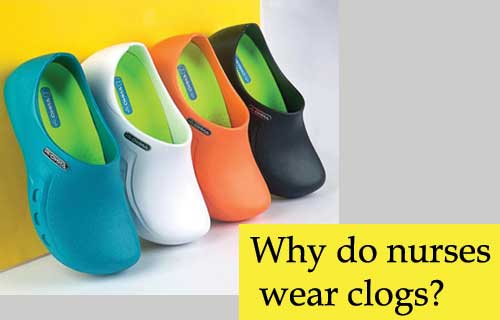
Nurses wear clogs for many reasons. The most important of these is their comfort and support. All day long, nurses need to be on their feet and this footwear helps them maintain the energy needed to perform their jobs perfectly.
Clogs also allow nurses to move quickly from one place to another as they may need to assist patients or move around a lot at work. Finally, because there are heavy foot traffic areas in hospitals and clinics that can get very messy due to spills or accidents, wearing shoes that are easy to clean is essential.
Let’s find out the exact history and reasons for wearing a clog without any further ado.
The history of clogs in nursing
The first clogs are from the Netherlands used by dockworkers and farmers, as they needed easy and quick access to their feet.
As they became more popular, nurses began wearing them in hospitals because of their easy access to frequent foot checks.
Nurses have been wearing clogs for over a century. Their history has roots in medical history, specifically, the sanitizing of doctors’ feet.
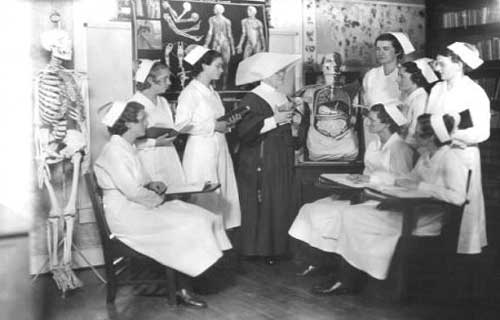
Before the invention of rubber boots, it was routine for doctors to wear wooden clogs with leather soles that were very hard to clean properly. Doctors often brought back infections from their patients and these infections can be devastating.
The first major outbreak was typhus and caused thousands of deaths worldwide, including many Americans, during the Civil War (1861-65). The epidemic shattered people’s faith in doctors, so all healthcare professionals, including nurses, were looking for shoes that would protect them against germs and risk.
Subsequently, the first mass-produced steel tow nursing clog was introduced in 1947, which was a huge step towards both comfort and safety. These steel-toe shoes will soon be common among all healthcare professionals, including doctors and dentists. Today’s plastic foot protection is an evolution of the basic design that began 150 years ago with these handmade wooden models!
Although clogs were used in the medical field before the 20th century, they did not become the mainstay of nursing uniforms until the 1960s.
The first documented use of clogs in nursing was by Florence Nightingale who used them to keep her feet warm when she worked at a hospital near an English river that could be quite cold. She then started to encourage other nurses to wear them too, as they were easy to clean and disinfect, which made them perfect for nursing work.
Check Also: Why do nurses wear white shoes?
Why do nurses wear clogs?
Nurses often need to be on their feet all day, and this can lead to foot pain if they don’t have the right footwear. Clogs are one of the best types of shoes for nursing staff. They keep your feet comfortable and dry by absorbing moisture during long shifts. They also feature slip-resistant soles that keep you safe on slick floors.
There are also many reasons for nurses wearing clogs, out of which I am explaining 10 important ones.
1. Durable and lightweight
Clogs are essential for nurses and healthcare professionals. So most nurses can’t think of an alternative to clogs for work, they know how important sustainable shoes are for long-term care.
Durable shoes like clogs also help you save money. Because they are made with an advanced material that does not corrode easily.
Plus there’s a cover of fabric for a lightweight, so they can be worn on legs over long shifts. They come in a variety of colors that match any outfit or work environment.
2. Support feet and ankles
Clogs are designed with nurses’ health in mind. It provides support to the ankles and feet for those who stand on their feet all day. They are made from premium quality natural materials as well as are super comfortable.
They have EVA foam and cushioned heels that support each of your steps more. Easily protects your feet from being hit by rocks, ice, and other solids.
3. Helps Decrease Back Pain
Most nurses suffer from back pain at some point in their lives, the main reason being not wearing the right shoes. And the biggest advantage of Clogs is that it can reduce the back pain of nurses.
Clogs can help reduce back pain by redistributing weight evenly across the entire leg. If you’re wondering just how these work, it’s all related to those big fat heels; This brings your legs into a physiological position that reduces stress on the joints and muscles.
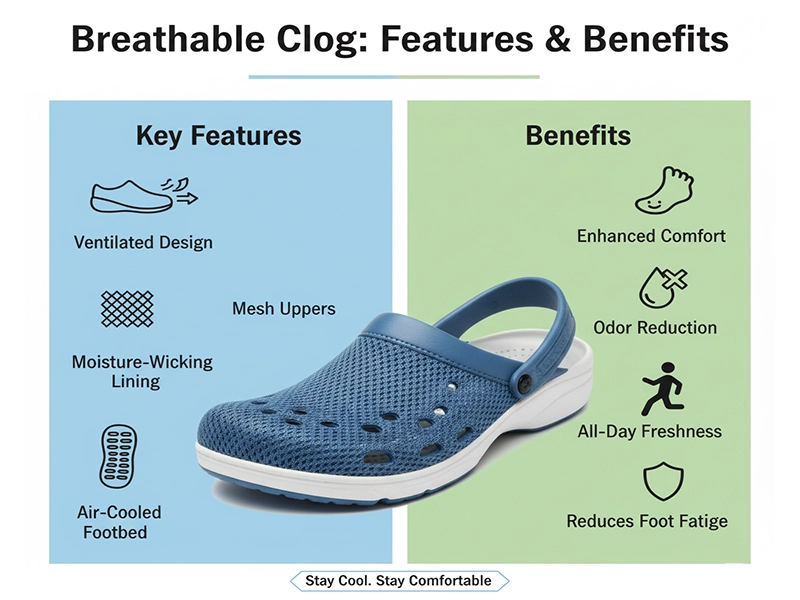
4. Comfortable wear
Clogs are known to be tied to nurses for professional reasons. They are a special type of footwear for nursing professionals because it is comfortable, convenient, and stylish.
Professional nurses have to work in hospitals, which means they must do a lot of walking around their hospital wards. Being on their feet all the time may cause them to get blisters or sore feet when wearing regular shoes.
When you wear special clogs, you can avoid this issue because they are designed with comfort in mind. Nurses’ clogs come with soft footbeds, so your feet can rest comfortably inside the shoe while you walk around without experiencing any pain.
5. Breathable
Nurses spend 12 hours on their feet every day. So to reduce fatigue and maintain comfort, they wear shoes like clogs and crocs. Because they have breathable properties, which help to keep the sweat-free.
6. No Laces
A clog is a type of shoe that is designed to be worn without laces. Nurses do not wear shoes with shoelaces at work because they can become loose during the care of patients or in dangerous situations such as surgery.
So these laceless clogs play a very important role in the work of nurses.
7. Easy to Clean
Nurses have to be very busy in the clinical environment so it is normal for their shoes to be very dirty.
However, if you do not have a lot of leisure time on your hands, you can easily keep nursing clogs clean.
Because they are easy to clean, so you can do it in a very simple way in a short time.
8. Easy to Put On and off
The clog is extremely popular for nurses as it is easy to turn on and off. This reduces the risk of injury due to the design of the back of the clog, which helps to wear and drop very comfortably.
Nurses also appreciate how comfortable they are to wear all day long, even after a long shift. Some nurses report that this is one of their favorite benefits when it comes to wearing nursing shoes. Clogs are often made with soft leather uppers that feel great on feet theyYou can heels or flats after hours. They also have cork insoles, which help absorb.
9. Not Slippery at All
If you’ve ever worked as a nurse, then you know just how difficult it can be to do your job without slipping and falling. It’s a common problem that hospital administrators have tried to solve for years – but the answer may come from a likely place: clogs.
However, the clogs are not slippery at all. You will find many nurses who are extremely happy with the great traction given by their clogs. These outsoles are highly slipped resistant, so are suitable for any nurse working in a wet hospital environment.
10. Clogs are the most dependable for nurses
Clogs are the most dependable, durable, and hard-working shoes for nurses. The footwear recommended for a nurse is the clog-style sweat-free foot shoe that helps prevent injury from falling heel straps.
Clogs help you avoid fatigue by providing excellent arch support, flexibility, sweat-free can steel-toe, and breathing.
Check also: Best white shoes for nurses with stylish and comfortable
The benefits of wearing clogs for nurses!
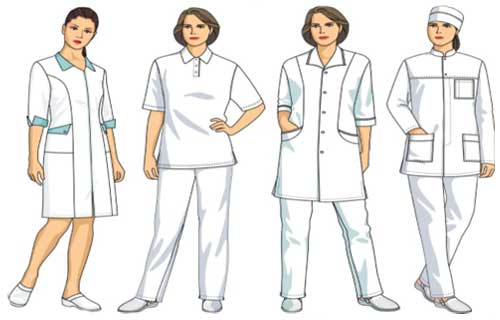
Clogs have many advantages, including:
# Clog keeps feet warm and dry during the winter months.
# Clogs can be worn even if the floor is wet or slippery, as these give good traction on wet surfaces.
# They support those who stand for a long time because footbeds support cushioning and arch.
Clogs can be worn all day and will help relieve tired aching feet and legs at the end of your shift. There is less strain on your knees and back, as no bending or squatting is required to pick up items from the floor. This also helps prevent physical injuries such as sprains, falls, or muscle strains.
Special benefits for nurses:
Good Design
Clogs are very popular in medical work, as they are the only shoes designed to meet the needs of nurses at work. They are designed in a comfortable and excellent style so nurses feel normal even after 8 hours of work a day.
Safety
Nurses are busy people. It is not always possible for them to keep an eye on the floor. Meanwhile, the big problem is that some surfaces of the hospital are dirty, which can lead to infection. You may not realize it, but some hospital floors have more germs than a public toilet seat.
Clog sleepers for nurses solve this problem by providing an extra layer of protection between the feet and the floor below. Now they can enter rooms without being concerned about getting sick from bacteria on the floor or other potentially harmful contaminants.
Productivity
The productivity of a nurse is very important and clogs can help to increase their productivity. There are different types of shoes for nurses, such as slip-on, slip-off, and lace-up shoes. With these kinds of shoe styles, it will be easy for you to do your job with comfort and convenience because usually, the position that you work at is not always clean and tidy.
Cost
Nurses are one of the most important members of the hospital staff. They take care of patients and provide important information about their condition and treatment plan. Their work is important for patient outcomes, so they need to have comfortable shoes to do their job properly.
Unfortunately, this is not always possible due to budget constraints. But an affordable clog lets nurses wear something comfortable. These are available at a very low cost.
Peace of Mind
Clogs are a foot-friendly alternative to traditional clog boots, and that’s why they’re perfect for nurses. The softness of the leather accommodates the natural movements of the foot, while still providing a non-slip surface. Clogs give nurses peace of mind when it comes to their feet.
Versatile
There are many benefits to wearing clogs for nurses. They look beautiful and feel great on the feet. Clogs can be worn with a scrub or with a pair of jeans. It can be worn by professional casinos as well as to join various parties.
Slip resistance
If you wear non-slip shoes after being a nurse, you can harm your patients.
Studies have shown that people who wear non-slip shoes are more likely to fall and get injured than people who wear slip resistance shoes! Meanwhile, slip-free shoes help nurses maintain their balance, which is perfect in a clog.
See also: Best Black Nursing Shoes
Clogs vs Sneaker: Which is best for nurses?
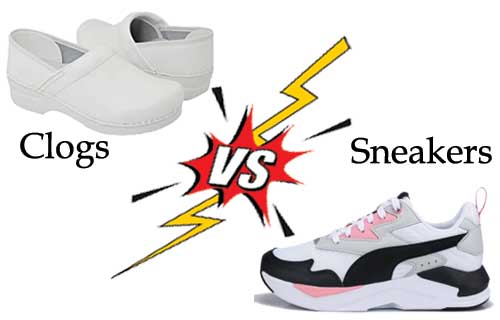
clogs vs sneakers, which one do nurses prefer to use at the workplace? We all know that nurses are on their feet for most of the day, so they need shoes that provide them with comfort and support.
But how do they know which is better?
Both the clog and sneaker have their advantages and disadvantages.
The main disadvantage of clogs is that they are not comfortable as sneakers. The main advantage of nursing sneakers is that they can be worn both inside and outside the hospital.
However, clogs offer additional advantages such as slip resistance, increased traction on slick floors, protection against floor contamination, and infection control due to proper foot.
Check Also:
Dansko women’s professional told clogs
What are your thoughts on the safety of nurse clogs today?
Nurses have been wearing clogs since World War II when they complained that traditional high heels were unreasonable in their jobs. Today’s nurse clogs are lightweight and comfortable but can still serve as an alternative to stilettos or pumps.
Nursing clogs are a staple in many healthcare settings. They offer nurses the support they need for standing all day without sacrificing comfort or style. The clog was originally designed to provide ankle support to nurses but offers much more than today’s nursing clog.
Wrapping UP
The most important reasons nurses wear clogs are mentioned above. Hopefully, they will help you better understand this footwear choice. If you want to know more about any type of nursing shoes other than clogs stay with us or if there is anything else we can do for you, feel free to contact us!
Related article

Leave a Reply